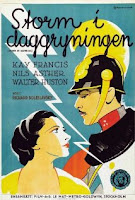Following the assassination of the Archduke Franz Ferdinand and the Duchess Sophia, a small town in Hungary begins to feel the effects of the war. Kindly mayor Dushan Radovic (Walter Huston) and his friend, Captain Geza Petery (Nils Asther) do what they can to minimize the effects, but, they have problems. The first is that Radovic is a Serbian, while Petery is Hungarian. The second is that Geza and Petery's wife Irina (Kay Francis) have fallen desperately in love.
Storm at Daybreak (1933) could have been a good movie. The elements are there. Unfortunately, the film is way too long, and feels as though it were padded for no very good reason. A party scene seems to go on forever, and to no apparent purpose - it attempts to inject humor into a situation where there is precious little. A scene in a railway yard brings Geza momentarily back into the lives of Irina and Dushan, but for no reason; he's gone in an instant, and it doesn't forward the action a jot. One wonders what the writers were trying to accomplish.
The script makes Walter Huston's Dushan comes across as a complete moron
who is unable to see that his wife and his supposed best friend are
having real problems. Despite the fact that Irina makes it clear that
she would rather Geza not be around their home, Dushan keeps bringing
him back, making it hard for two people who want to forget their
feelings for one another to function. And Huston, a remarkable actor in so many other roles (watch him in Dodsworth, for example) overacts horribly. Also opting for over-the-top is C. Henry Gordon as the villainous Panto Nikitch. He manages to twirl his mustache without even having one. One can almost hear the director (Richard Boleslawski - this TCM article provides a bit more information about him) shouting "Give me MORE!!" We wanted a lot less.
The New York Times review (the reviewer was Andre D. Senwald), though calling the film "dull entertainment", was far more impressed than we were with Huston (who "blusters picturesquely"), but not very complementary of Ms. Francis (she "hardly seems suited to the enigmatic and mysterious qualities demanded in the rôle of the wife.") Quite honestly, Kay Francis is the best thing in the movie. She doesn't have a whole lot to work with - the part is formulaic at best. But she carefully underplays Irina, making her far more attractive. That being said, a scene in which she runs out into a rainstorm in a huge dress (she could barely get it through the door) to warn her lover of impending doom, was almost ridiculous. Not her fault - she actually GOT the dress through the door - but a true waste of her talents.
We have two favorite character actors present: Eugene Pallette as Janos, Geza's aide-de-camp, and Louise Closser Hale as Militza Brookska, the housekeeper in Dushan's home. Attempts are made to milk their performances for some humor; mostly, it doesn't work (though Pallette does get all the best lines.) By and large they are wasted, as is everyone else in the cast.
That the film is formulaic is not really a problem, usually it's a formula we like. But this one is not going down as our favorite Kay Francis movie.




No comments:
Post a Comment
Thanks for your interest in this blog. Your comments will be moderated to minimize spam to the website. Thanks for understanding.